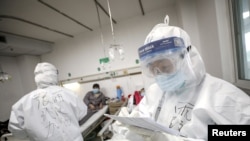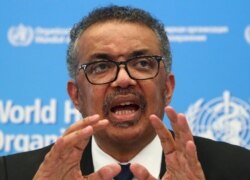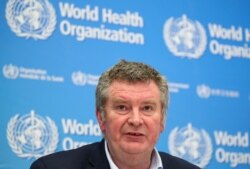The World Health Organization is expressing concern about the increasing number of health workers getting infected with the deadly coronavirus, known as COVID-19.
The WHO says the number of cases in China now tops 63,000, more than one-quarter in Hubei province, the epicenter of the disease. The number of deaths is 1,381, including 100 newly reported cases.
While cases and deaths continue to mount inside China, the disease, for now, seems to have stabilized globally. The last count finds 505 cases in 24 countries, including two deaths, one each in the Philippines and Japan.
Data released by China finds more than 1,700 health workers have been infected with the disease and six have died. WHO Director General Tedros Adhanom Ghebreyesus calls this a critical piece of information.
“Health workers are the glue that holds the health system and outbreak response together,” said Tedros. “But we need to know more about this figure, including the time period and circumstances in which the health workers became sick.”
Executive Director of WHO Heath Emergencies Michael Ryan says it is not unusual for health workers to become infected during disease outbreaks. He says the WHO and China are exploring the time period in which the infections have occurred.
“Our understanding is that the cases amongst health workers peaked in the third and fourth week of January and there has been a rapid falloff in the number of cases that have occurred in health workers in the last two weeks,” Ryan said. “This may reflect increased levels of training, increased levels of protection and also increased levels of awareness. Remember, this outbreak has come, expanded very quickly in an unsuspecting health system.”
The WHO says a joint mission with China on COVID-19 is moving forward. It says 12 international and WHO experts will arrive in China in the next few days.
They and an equal number of Chinese scientists will hold brainstorming sessions to understand the origins and evolution of the mysterious disease. WHO officials say particular attention will be paid to understanding the transmission of the virus and the severity of the disease.






